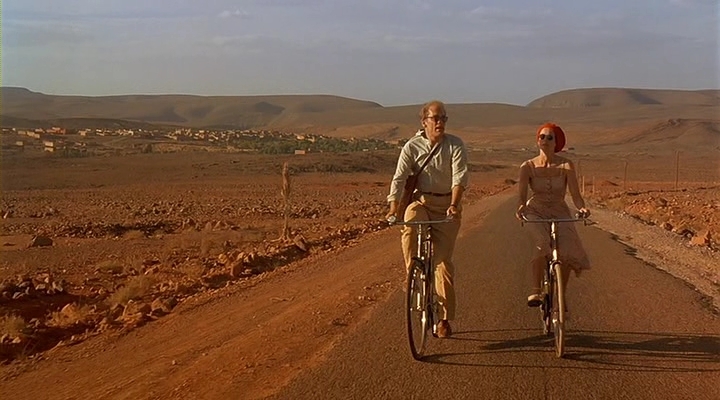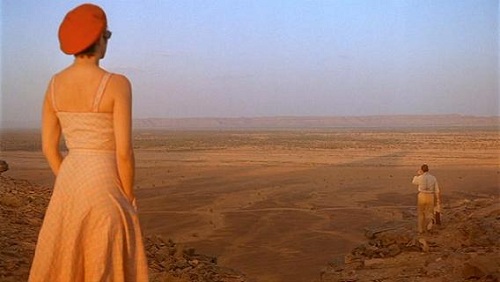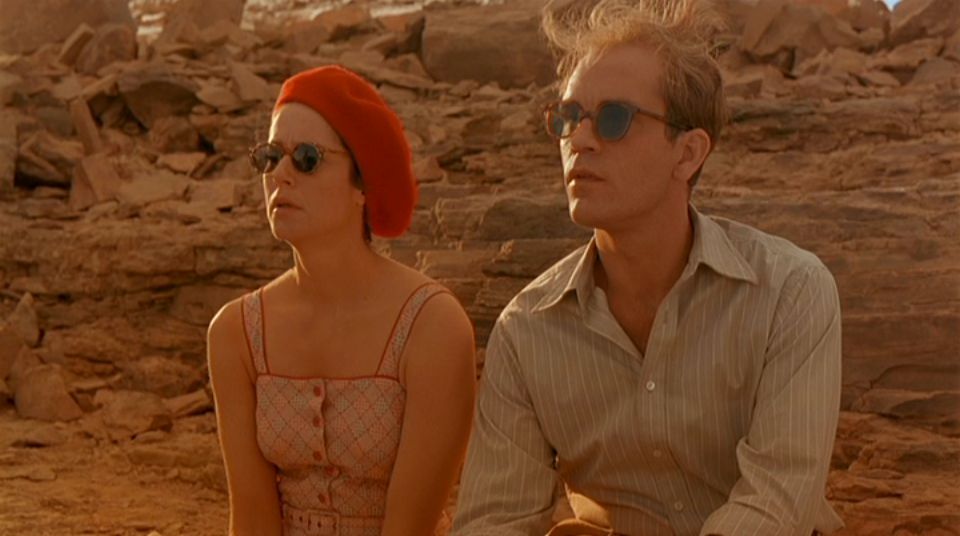Bernardo Bertolucci’s 1990 film The Sheltering Sky follows Kit Moresby (Debra Winter) traveling with her two male companions through sandy villages across North Africa in the middle of the 20th century. They claim they are not tourists, but travelers—meaning they have passports, suits and cash, but no formal plans to return home. Like his earlier Last Tango in Paris (1972), this is the story of despondency. That film was brutal in its images, allusions and sentiments. The Sheltering Sky, by contrast, is elegant: very quiet, frequently beautiful, but no less despairing.
Kit is somewhat estranged from her husband Porter (John Malkovich). She is a playwright, he is a composer; they speak different languages. They travel together, but sleep in separate rooms. Their conversations are cordial, but when she speaks, she seems to keep herself distant from him, guarded against him. When he speaks, he seems ready to burst from frustration. He hopes to enter her body and soul in intimacy, but she keeps him waiting at the door. A common marital failing is that self-perpetuating circle of anger, broken conversation and sparse intimacy. They have all three: Their beds are 20 feet apart, and they cannot speak without insinuations escalating into aggression.
Bertolucci’s films are frequently expositions of dual, contrasting stories, told in the same narrative. Last Tango in Paris was the story not only of a man deteriorating, but also of a woman abused. The Sheltering Sky is both Kit’s and Port’s stories, but they are two different ones. Here in North Africa, in the open air surrounded by mountains at the edges of sand hills, she hopes for the freedom to find herself, while he hopes the great expanse will give them space to redeem their threadbare relationship. Save for an all-too-brief moment of convergence, their different goals yield a tug of war. Most mainstream American films would demand a winner in this interpersonal conflict. Here, however, though one outlasts the other after a sudden plague, both ultimately get lost.
Kit rides the train with their other companion, Tunner (Campbell Scott). In keeping with her tendency to make spontaneous decisions, she has a full, secret, casual, but unapologetic relationship with him independent of her marriage with Port. They wonder if Port knows. He obviously does, but hides his sentiments in passive-aggressive dialogue. Nevertheless, they do not slow down. In other moments, she decides to celebrate something, but she does not know what. At a major point in the film, she abandons him, venturing across the desert to wherever people might find her and take her.
Despite the wide open tracts of the gravelly environment, the world seems to suffocate Port: That sky which colors the horizon, gives remarkable shadows, and protects them from the elements is actually crashing down on him. His choices seem to keep failing them. He goes for a walk, and gets lured by a sex trafficker who tries to rob him. They go on a bus ride and he gets sick. Flies seem to smother him just about everywhere. He is reminded of death wherever he goes, either with a body carried to its funeral, or an accidental walk through a cemetery.
That wandering aimlessness and frustration seems the common lot of the wealthy in literature. These are Americans of privilege, accustomed to freedom of thought and action, obliging the world to serve them. Think of the characters in F. Scott Fitzgerald’s The Great Gatsby, but escaping from West Egg into Morocco to calm their visceral unease. That unease might simply be boredom, rooted in the lack of need. But hovering around Kit and Port is this sense of fate as a force suppressing them. It’s a strange contradiction. Life in the city is crowded, yet they are masters of their will. On the other hand, life in the wide hot Sahara is constricted.
Everywhere they go, they seem to run into the same people. A British mother and her son keep appearing, for one thing: the mother providing pompous criticism of the natives at every opportunity; the spoiled-brat son always asking for money while stealing Port’s possessions. But the most noteworthy recurring character turns out to be none other than Paul Bowles, the author of the film’s 1949 source novel. Bowles manages to drink coffee in every coffee house they visit. He keenly watches these characters, with a look of concern. They are living his life, making his mistakes. He cannot stop them, for the author’s pen in the life of the characters is the hand of fate. If anything, he seems to pity them.
This is certainly a risky narrative gambit, bold in its self-reflexivity (the kind of creative approach we would call “meta” these days). The results are decidedly mixed. Bowles’s presence in the film suggests a contemplative distance that would theoretically lend a sense of perspective to the archetype of crass Americans in the exotic world, throwing money at the natives to compensate for their insolence. But the natives—very brutish, swarthy, filthy—never come off as anything more than a different species of human, just as peculiar as the camels and architecture. The soundtrack mixes North African sounds with inappropriately placed Turkish recitations. So either this film is a commentary on the arrogant failure of White Privilege in a distant land, or it embodies White Privilege, showing the Americans as civil observers of a messy world, lumping everyone together. Just as the film gives us two narratives simultaneously, it perhaps offers two contradictory perspectives.
In the end, Kit, still looking to find herself, finds a temporary peace, dressed in a mask, locked in a room in some miscellaneous town. She may have married a man, perhaps as a third or fourth wife—but now, he keeps her locked in a small bridal suite. Constricted in location, access, accessibility, and identity, she is finally happy—at least, until she removes the mask and reveals her true self to everyone. Then, she wanders home into Paul Bowles’s arms, lost. He comments to her that amidst our topsy-turvy emotions, life winds up as a set of days, some of which are memorable, but most or all of them ultimately forgettable. How many times do you remember even the most significant days of your life? Even looking at our most devastated or inspired moments, they will be forgotten. Perhaps that is the greatest sorrow of the people of means: they have everything, but not eternity.



















